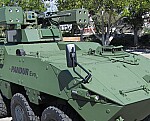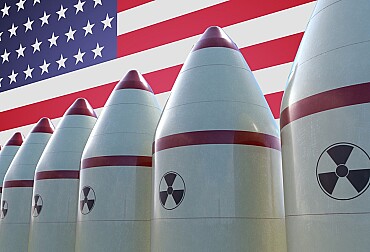New British Strategic Defence Review to fix the "disastrous state" of the UK Armed Forces
Two weeks after taking office at 10 Downing Street, the new British Prime Minister Keir Starmer has launched a Strategic Defence Review, the last of which was published in 2021, before being revised two years later to take account of the war in Ukraine.
At the beggining of his announcement Keir Starmer said: "...sadly, the world we live in today is perhaps more dangerous and volatile than at any time since then, and frankly, for my generation, that's a shock (...). I mean look at Ukraine now. Industrial capacity is an absolutely critical part of security. So with Labour, Britain will be fit to fight. Within the first year of a Labour government, we will carry out a new strategic defence review. And we're absolutely committed to spending 2.5% of GDP on defence as soon as possible."
In recent years, the British armed forces have undergone numerous reforms, most of which have led to a reduction in their size. And this despite a budget equivalent to 2% of GDP. Having lost out on a number of trade-offs, in particular to the Royal Navy with its two aircraft carriers, the renewal of its nuclear submarines and the launch of Type 26 and Type 31 frigates, the British Army has seen its capabilities and, above all, its numbers shrink. The Royal Air Force is no better off. A parliamentary report published in 2022 having estimated that it would be no match for a "high-intensity" conflict, which is true for too many armed forces of the European NATO member states.
The British forces are also, like many other armed forces today, facing major problems in terms of recruitment, retention and training. Compared with 2003, when they were simultaneously engaged in Afghanistan (Operation Herrick) and Iraq (Operation Iraqi Freedom), their overall size has fallen by 30 %. And like in other countries, the British procurement procedures and major weapons programmes are generally overpriced and delayed. The work of the new Strategic Defence Review will be led by George Robertson, former Secretary General of NATO. The review will utilise views from experts including military personnel, industry and academics. Defence Secretary John Healey will oversee the review, and the defence review team will be supported by a secretariat from the Ministry of Defence.
"I promised the British people I would deliver the change needed to take our country forward, and I promised action not words. That’s why one of my first acts since taking office is to launch our Strategic Defence Review. We will make sure our hollowed-out armed forces are bolstered and respected, that defence spending is responsibly increased, and that our country has the capabilities needed to ensure the UK’s resilience for the long term," said Keir Starmer. At the last NATO Summit in Washington the Prime Minister reaffirmed his serious commitment to spending 2.5% of GDP on defence.
Defence Secretary John Healey said: "At the start of a new era for Britain, we need a new era for defence. Hollowed-out armed forces, procurement waste and neglected morale cannot continue. Meanwhile, we need to be clear-eyed about the threats we face, with the world becoming more volatile and technology changing the nature of warfare. In response, our armed forces need to be better ready to fight, more integrated and more innovative. We need clearer accountability, faster delivery, less waste and better value for money. The Review will ensure that Defence is central to the future security of Britain and to its economic growth and prosperity."
Due to be published in the first half of 2025, Strategic Defence Review’s focus will be:
- Put personnel across defence at the heart of future defence work. Ensure that the UK continues to lead in NATO.
- Strengthen UK homeland security.
- Bolster Ukraine in its fight against Russian aggression.
- Modernise and maintain the nuclear deterrent.
- Adapt military services and equipment programmes to meet requirements.
- Help drive the guiding principle of One Defence
"The UK Army is in a disastrous state," said an unnamed American general to British Defence Secretary Ben Wallace in January 2023. According to Sky News, the senior US general went on to classify the world's armies into several categories. According to him, the United States, Russia, France and China have the best troops on the planet and are therefore placed in "category 1". Germany and Italy would follow suit and would therefore be placed in "category 2". The British army would barely qualify for the second category. Senior officers in the British Army also deplored "a very worrying decline in the British fighting force". Many reasons were given for the "disastrous state" of London's military power. "Our army is simply too small, we have cut down by 10,000 troops", said Tobias Ellwood, Chairman of the UK Defence Committee, and said the equipment was obsolete and insufficient: "We've whittled down our capability – we had 900 tanks a couple of decades ago, we're now going down to 148." According to him, the British army would also run out of ammunition "in a matter of days" if a conflict broke out. Furthermore, London's troops would probably be unable to defend the skies against the level of missile and drone strikes currently being seen in Ukraine.
These are the major problems the Strategic Defence Review is to solve. The element of deterrence is key in terms of ensuring safety. Credibility and persuasiveness play a crucial role in this. It remains to be seen to what extent the new Strategic Defence Review will succeed in defining the principles for strengthening the British Armed Forces in the context of economic and general societal developments, effectively returning the UK to being a relevant world military power.








